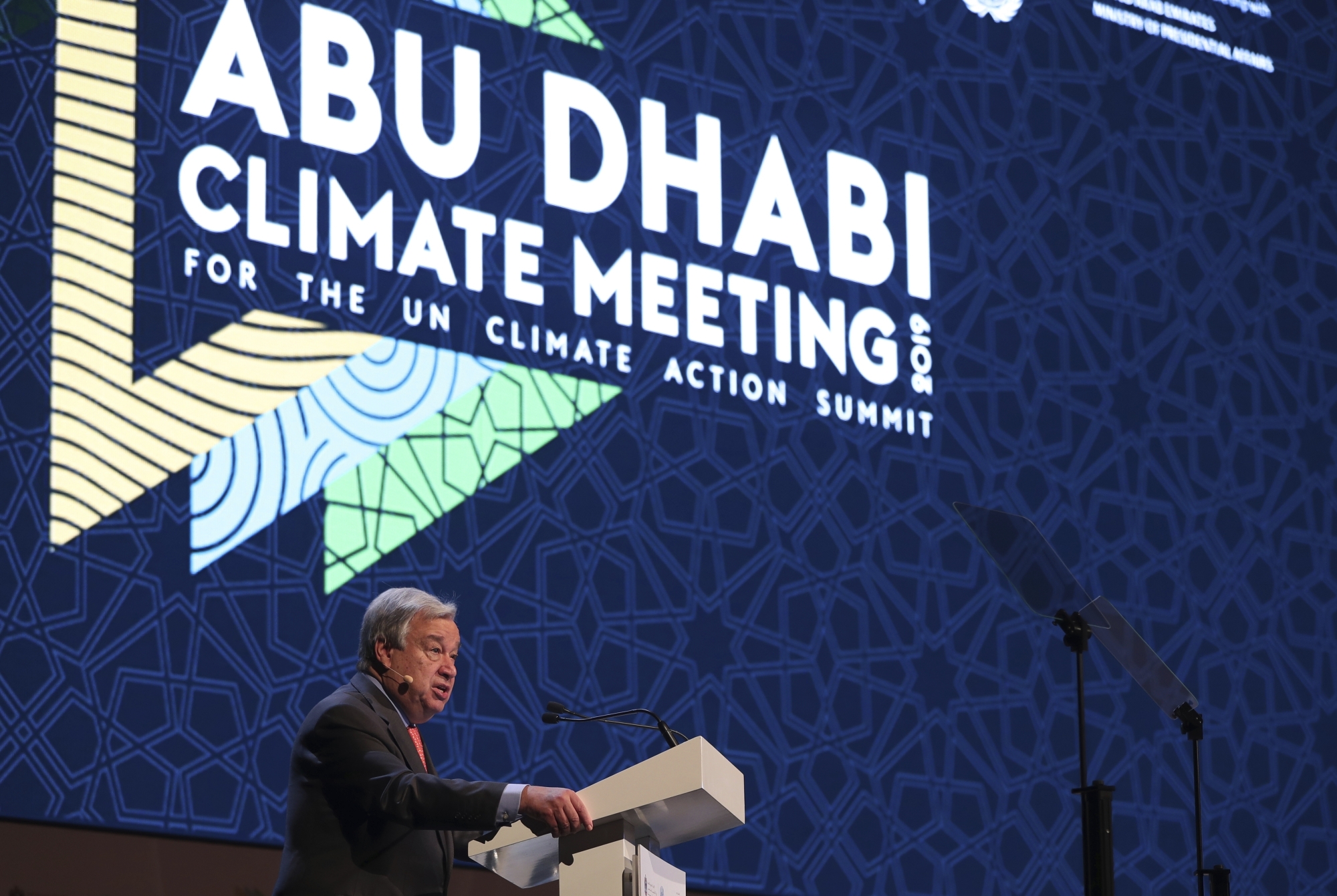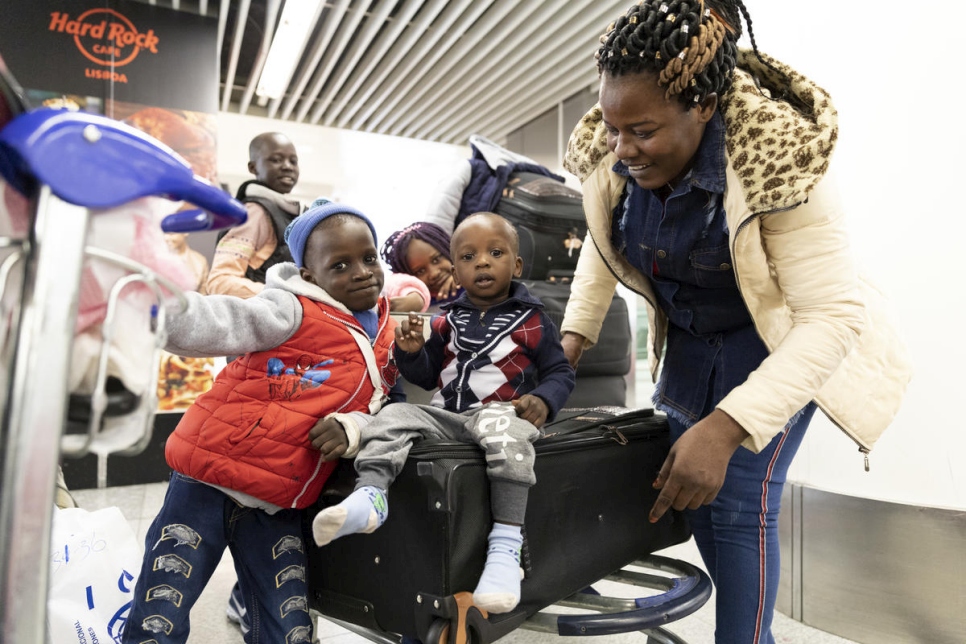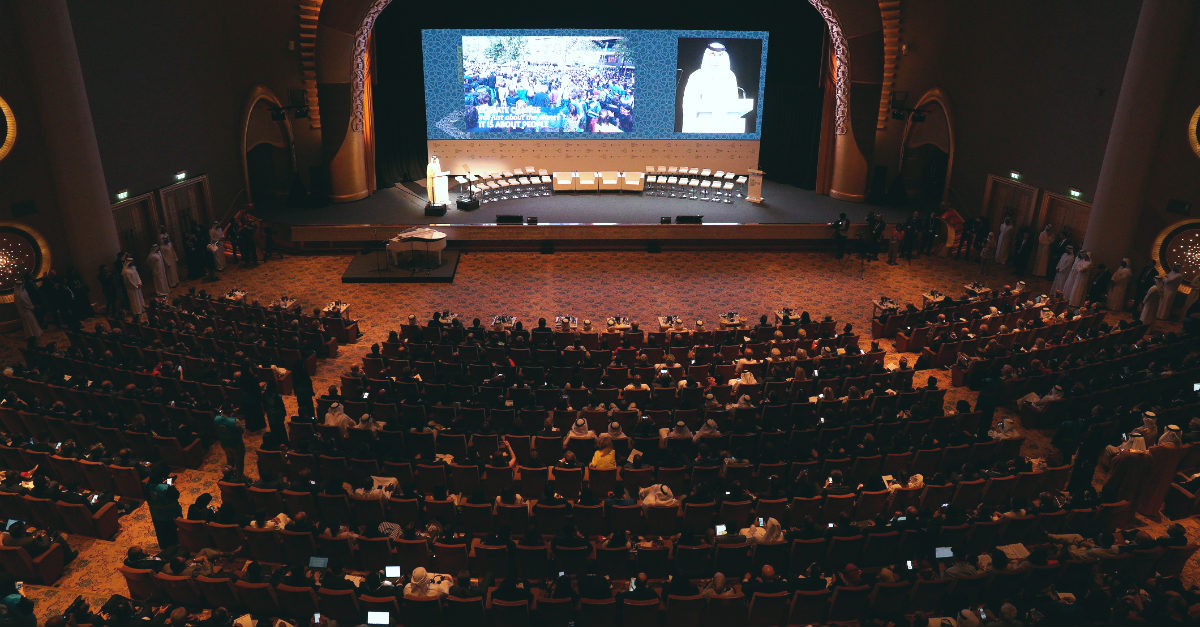UN Secretary-General warned Abu Dhabi Climate Meeting about “climate emergency”, UNHCR presented a new strategy on refugee resettlement and IRENA urged for a faster renewable energy deployment. Here is what you missed from last week’s headlines in the international development sector:
UN Secretary-General: The world is facing “a grave climate emergency”
At the Abu Dhabi Climate Meeting, UN Secretary-General António Guterres addressed leaders attending the event, saying that the world is facing “a grave climate emergency” and stressing that climate change is progressing faster than the world’s top scientists have predicted. He also noted that many countries are not keeping pace with their promises under the Paris Climate Change Agreement.
“Keeping global warming to 1.5 degrees at the end of the century will require “rapid and far-reaching transitions” in how we manage land, energy, industry, buildings, transport and cities (…) I am asking all leaders, from governments and the private sector, to present plans – at the (Climate Action) summit or at the latest by December 2020 – to cut greenhouse emissions by 45 percent by 2030 and get to carbon neutrality by 2050.” urged Mr. Guterres.
2020 is the year that governments will be submitting revised and improved national action plans (also known as Nationally Determined Contributions, or NDCs) under the Paris Agreement. This year is being termed as the ‘year of climate ambition’, given that the concrete climate action plans need to be designed and presented well ahead of any formal submissions under the Paris Agreement.
The Abu Dhabi Climate Meeting unfolded amid news about heatwaves and high temperatures rising in frequency and intensity around the globe, with many new temperature records in both hemispheres. The unusually early heatwave in Europe – with temperatures in France and Spain exceeding 40°C – is just the latest in a series of extreme weather events. According to the World Meteorological Organization, the world is on track for 2015-2019 to be the warmest five years on record.

New strategy on refugee resettlement presented by UNHCR
More than 1.44 million refugees currently residing in over 60 refugee-hosting countries will be in need of resettlement in 2020, according to the Projected Global Resettlement Needs 2020 report, which was launched at the Annual Tripartite Consultations on Resettlement (ATCR) in Geneva.
To share responsibility and show solidarity with host countries supporting large refugee populations, increasing opportunities for refugees to move to third countries, through resettlement and complementary pathways for admission, including family, work and study routes, is one of the key objectives of the Global Compact on Refugees (GCR).
To work towards this outcome, UNHCR and partners presented a Three-year Strategy (2019-2021) on Resettlement and Complementary Pathways at the ATCR. This UNHCR-led multi-stakeholder Strategy, which is called for in the Global Compact on Refugees, aims at increasing the pool of resettlement places and the availability of complementary pathways for admission, as well as expanding the number of countries offering resettlement and complementary pathways programs.
“The Three-Year Strategy represents a unique opportunity to translate the aspirations of greater solidarity and responsibility-sharing into tangible results in the form of solutions for refugees,” said UN High Commissioner for Refugees Filippo Grandi, who opened the two-day Annual Tripartite Consultations on Resettlement (ATCR) in Geneva.
The Strategy, which is the outcome of extensive consultations with a broad range of stakeholders, aims to expand third country solutions so that by the end of 2028, 3 million refugees benefit from effective protection and solutions through, resettlement (1 million) in 50 resettlement countries and complementary pathways (2 million).

IRENA urged for more climate ambition through renewables
The tools required to meet the decarbonization goals of the Paris Agreement exist today and are technically feasible and economically attractive, was the message presented by IRENA at the UN’s Abu Dhabi Climate Meeting.
“(Renewable energy) is the competitive backbone of global energy decarbonization and an essential and ready instrument to achieve the Paris Agreement goals,” said Francesco La Camera, IRENA Director-General.
However, to meet climate goals, deployment needs to happen six times faster than it is today. IRENA estimates that keeping global average temperature rise well below 2 degrees Celsius by 2050, means two-thirds of the world’s energy should be renewable.
A clear opportunity lies in increasing ambition under Nationally Determined Contributions (NDCs), noted the renewable energy agency. Currently, NDCs would increase installed renewable power capacity by 3.6% annually to 2030, yet annual renewable energy deployment has actually increased by 8.5% over 2015-2018. Therefore, IRENA emphasized that NDC targets could already more than double just by reflecting the current pace of renewable energy deployment.

Here’s what else has happened
Swine Fever: The rapid spread of African Swine Fever across East and Southeast Asia is threatening the food security and livelihoods of millions of households in the region which rely on pig farming. Since the first reported outbreak of ASF in the northern Chinese province of Liaoning in August 2018, the disease has swept through the country, and 32 of the country’s 34 mainland provinces have since been affected.
Nuclear fusion: The International Atomic Energy Agency (IAEA) and the ITER International Fusion Energy Organization have agreed to strengthen their cooperation in nuclear fusion research and related activities with the long-term goal of realizing fusion energy production on an industrial, power-plant scale. Under the arrangements, ITER will share its experience related to nuclear fusion safety and radiation protection with the IAEA and its 171 Member States.
Critically ill children: Unitaid announced an initiative to put affordable diagnostic devices into the hands of frontline health workers in Asia and Africa to help better identify critically ill children and refer them for treatment without delay. The project, spanning nine countries, will focus on technologies that simultaneously address multiple diseases, including pneumonia, diarrhea and malaria.
EU Trust Fund for Africa: The European Commission has approved five new migration-related programmes in North of Africa totaling €61.5 million. The programmes under the EU Emergency Trust Fund for Africa will help to protect vulnerable people, stabilize communities, and reduce hardship for migrants, refugees and local people in areas most affected by migratory flows.
Cholera vaccination: More than a million people were vaccinated against cholera in Phase 2 of the biggest ever oral vaccination campaign which took place last week in the Democratic Republic of the Congo (DRC). The purpose of the vaccination campaign was to contain the serious epidemic which resulted in 458 deaths in the Kasaï region during 2018.
Reports
Crop Prospects and Food Situation: FAO Quarterly Global Report
Ongoing conflicts and dry weather conditions remain the primary causes of high levels of severe food insecurity, hampering food availability and access for millions of people, according to the Crop Prospects and Food Situation report. The report by the Food and Agriculture Organization of the United Nations states that 41 countries, of which 31 are in Africa, continue to be in need of external assistance for food, unchanged from three months ago.
The report forecasts, among others, that largest year-on-year cereal production decreases in 2019, in relative terms, are expected in Kenya, Somalia and the Sudan, where harvests are anticipated at below-average levels. The report also notes that in Asia, a below-average 2018/19 wheat and barley outputs are expected in the Democratic People’s Republic of Korea and there are also concerns for the main 2019 season crops, to be gathered by October, largely due to reduced rainfall and low irrigation water availability. Food insecurity in Zimbabwe is likely to worsen considerably in 2019, as well, exacerbated by large spikes in staple food prices and the economic downturn. At the start of 2019, already about 3 million people in the country were considered to be food insecure.
Aid for Trade at a Glance 2019: Economic Diversification and Empowerment
Using development aid to build trade capacity in poor countries is helping to improve economic diversification and to economically empower marginalized groups, yet progress remains geographically uneven, according to the latest OECD-WTO report on Aid for Trade.
Aid for Trade at a Glance 2019: Economic Diversification and Empowerment says that 47 developing countries (mostly in Africa), out of the 88 surveyed, report progress in diversifying their economies since the OECD-WTO Aid for Trade Initiative was launched in 2006, a picture backed up by trade statistics.
“Aid for Trade is working. It is having a real impact where it is most needed,” said OECD Secretary-General Angel Gurría, launching the report at the WTO’s 2019 Global Review of Aid for Trade in Geneva. “That said, the path towards economic diversification is complicated by subdued trade growth and a decline in FDI. Rising trade tensions and protectionism are hurting growth prospects and any shift away from rules-based trade hits the most vulnerable countries and people hardest.”
Every US dollar invested in aid for trade has been found to generate USD 8 worth of exports in developing countries and nearly USD 20 of exports in least-developed countries, depending on the country and the type of investment, the report noted. It added that open, rules-based trading contributes to global welfare by helping to diffuse goods, services, technology and knowledge, though many developing countries still face numerous supply-side constraints.
Events
2019 Senior-Level Meeting (SLM)
New York, USA
13-14 July 2019
The 2019 Senior-Level Meeting, bridging Nairobi and the next High-Level Meeting, is the first of its kind and will seek to galvanize governments, civil society and other actors into the ‘gear change’ needed to accelerate SDG implementation at the country level and globally. The event will highlight the importance and contribution of effectiveness by showcasing tools – from and for the country level – for making development co-operation more effective. It will present new approaches to effectiveness in different contexts, and chart new ground, in view of global trends, for advancing effectiveness.
Regional Technical Expert Meeting on Circular Economy and Waste-to-Energy
Montevideo, Uruguay
23 August 2019
The meetings is organized by the UNFCCC secretariat in collaboration with Technology Executive Committee, the Climate Technology Center and Network, and the United Nations Industrial Development Organisation, in conjunction with the Latin America and Caribbean climate week. It will focus on various solutions aimed at achieving a shift towards circular economy and the associated triple win: economic, environmental and employment.
Seventh Tokyo International Conference on African Development (TICAD7)
Yokohama, Japan
28-30 August 2019
The Tokyo International Conference on African Development is an international conference led by the Japanese government and co-sponsored by the United Nations, the United Nations Development Programme (UNDP), the African Union Commission (AUC) and the World Bank. Considered the largest international conference held in Japan, it will focus on the theme, ‘Africa and Yokohama, Sharing Passion for the Future’.

